New Update: Boost Social Proof with Reviews & Automation
New Update: Boost Social Proof with Reviews & Automation

 John Turner
John Turner
 John Turner
John Turner
Contest SEO wasn’t something I thought about when I first ran an online giveaway. I focused on getting entries but missed out on valuable traffic and backlinks. Once I started applying SEO for contests, everything changed.
In this guide, I’ll show you how to optimize your contests with contest marketing SEO and build a giveaway SEO strategy that drives lasting results.
In This Guide:
Contest SEO combines the excitement of contests and giveaways with search engine optimization. Rather than getting a burst of attention during your contest, it involves planning and executing your marketing strategy for lasting SEO benefits.
Here’s how contest SEO works:
Key Takeaway: Contest SEO uses contests and giveaways strategically to boost your website’s search rankings, generate backlinks, and encourage social sharing that increases visibility.
Now that you understand the power of Contest SEO, it’s time to put it into practice. Follow these steps to ensure your next contest delivers maximum search engine visibility.
While you can technically build contests manually, contest plugins or platforms streamline the process and often include features built with SEO in mind. One of the most popular options is RafflePress.

RafflePress is a powerful yet user-friendly WordPress plugin for creating viral contests and giveaways. It makes creating any contest in WordPress a breeze.
Here’s why it’s great for SEO:
If you need help getting started, you can see our in-depth guide on how to run an online contest in WordPress.
There are, of course, other reputable contest tools available. When choosing one, look for features like social sharing options, mobile responsiveness, and the ability to customize URLs for SEO.
Keywords are what people use to search for something online. Choosing the right ones makes it easier for them to find your contest in search engine results pages (SERPs).
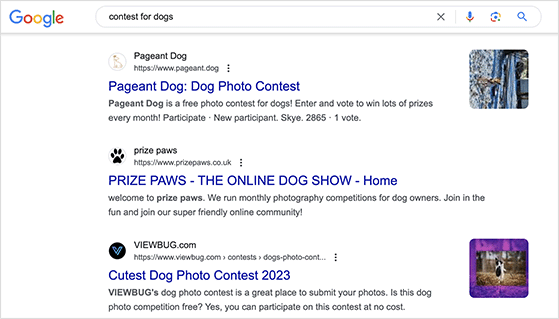
Start by looking at your target audience. Who are you trying to reach with your contest? Understanding their interests and behavior gives clues about what they will likely search for.
It’s also a good idea to align your contest theme with keywords relevant to your industry and audience. For example, a bakery wouldn’t choose keywords related to “running shoes” but might focus on “baking tips” or “cake decorating ideas.”
Use SEO tools to find relevant keywords. WPBeginner’s keyword generator tool is a good place to start since it’s 100% free.
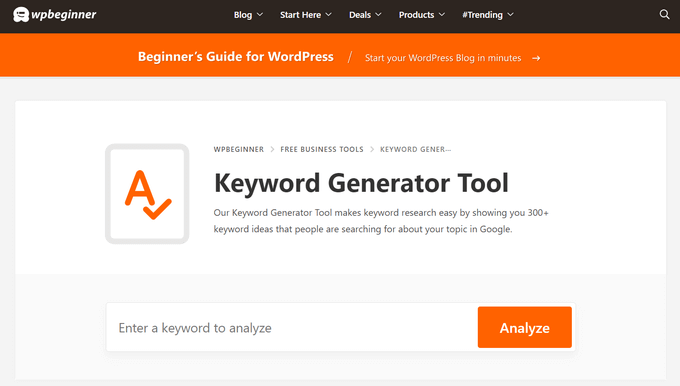
When using it, look for long-tail keywords (more specific search terms) to attract targeted traffic. In our example below, we’d pick a phrase like “contest for dogs” instead of “contest.”
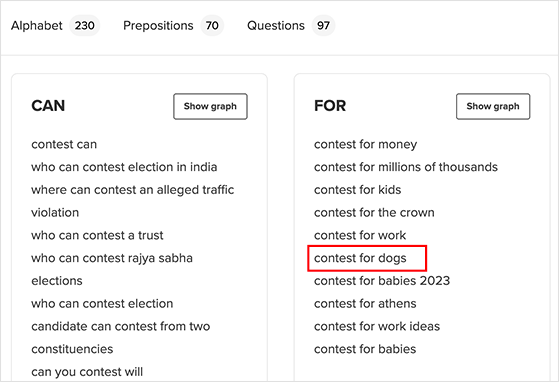
Also, choose a contest theme that has lasting appeal.
Seasonal contests are exciting. However, a theme with broader interest can generate traffic and backlinks even after the contest ends.
For instance, a gardening center could host a competition for the most impressive vegetable garden.
Vegega Garden ran something similar with their gardening photo contest:
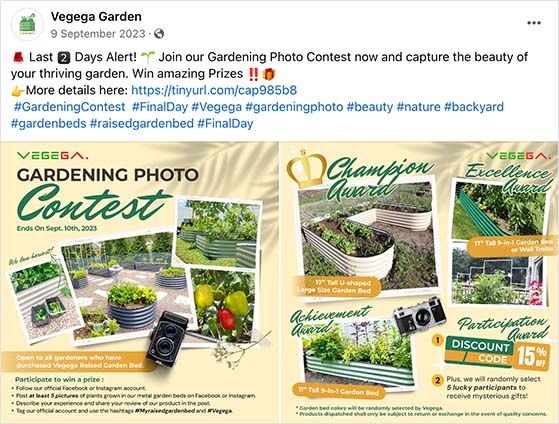
A competition like this shows expertise and stays interesting year-round.
Once you know what keywords to use, add them to your giveaway landing page to make it search engine-friendly.
Include your target keywords in the page title, meta description, headers, and throughout the content. Don’t force it too much – make sure it sounds natural.
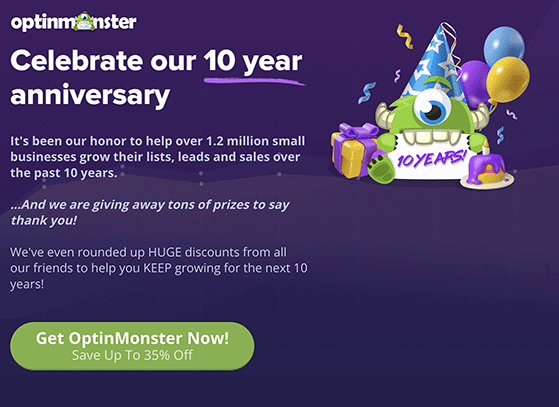
Similarly, keep your contest description engaging and to the point. Focus on the benefits of entering and how to participate.
You should also use high-quality images or videos about the prize and your brand to draw interest and encourage sharing.
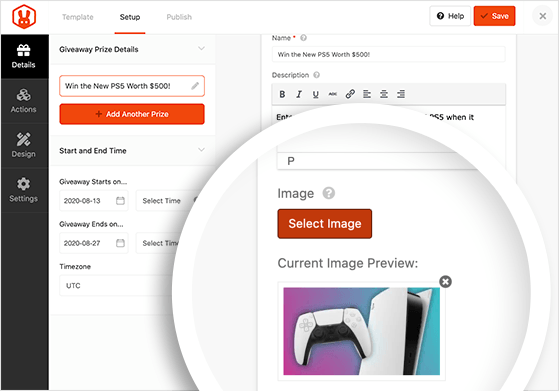
In RafflePress, for example, you can upload prize photos and write a custom description right inside the giveaway widget.
All campaigns are also mobile-friendly. That way, your landing page looks great and is easy to use on mobile devices.
Including rules for your contest helps avoid disputes and potential legal issues. They also help your SEO by making your contest feel more trustworthy.
Additionally, they keep users on your page longer. This can reduce bounce rates, another important SEO ranking signal.
When creating your contest rules, clearly define the following aspects:
You should also include a brief legal disclaimer. Use it to show that your contest complies with relevant laws and that you can amend the rules if needed.
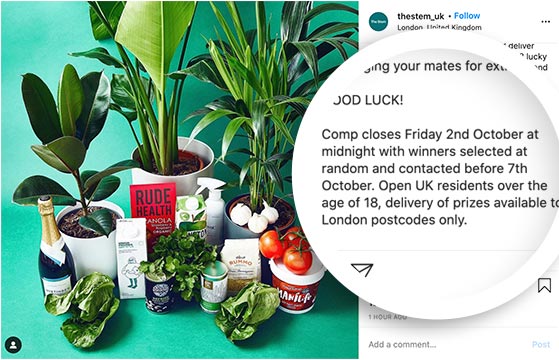
Try to avoid overly legalistic language. Use clear, everyday terms that average users can easily understand.
After creating them, display a link to the rules on your contest web page.
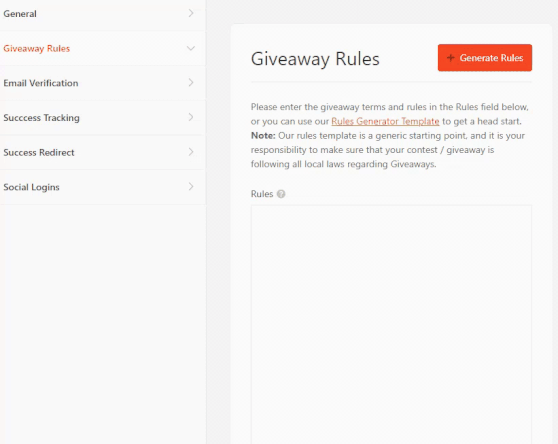
In this example, we used RafflePress’s giveaway rules generator to write our guidelines quickly. The plugin displays rules beneath the giveaway widget so users can read them easily.

Creating a great SEO contest is only half the battle. To maximize its reach and get the full SEO benefits, you need a strong promotion strategy.
Here are some of our tried and tested methods to promote your contest:
Create shareable posts for your major social platforms (Facebook, Twitter, Instagram, etc.). Encourage sharing by offering bonus entries for those who spread the word.
RafflePress’s viral refer-a-friend giveaway action is ideal for this.
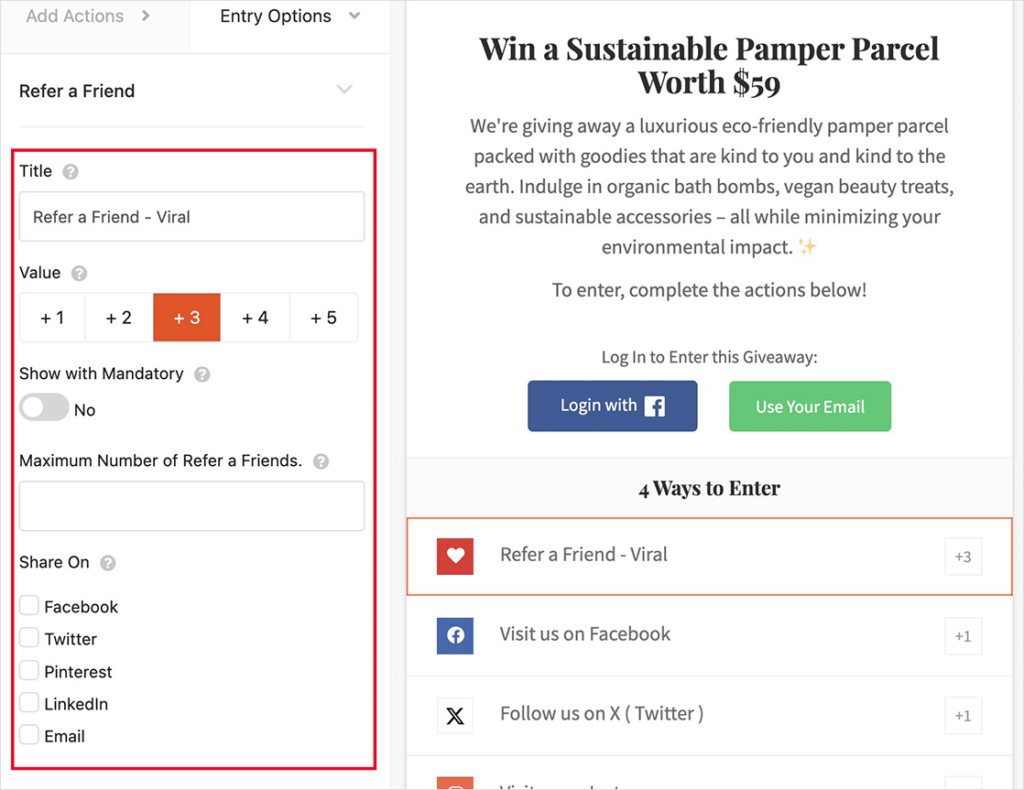
Users enter by sharing your contest on social media. This creates a viral loop that attracts more entries and boosts brand awareness.
Email marketing is another excellent way to reach your audience. Send dedicated emails to your subscriber list promoting the contest.
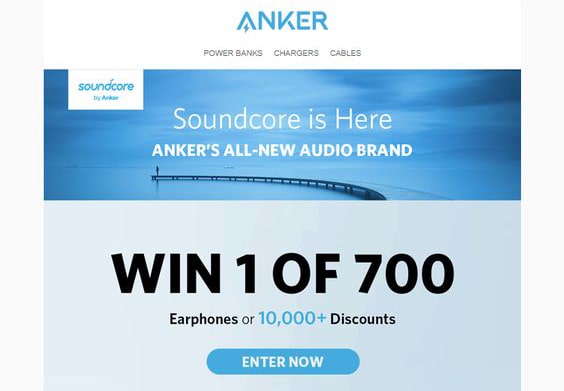
You can even segment your list for better results by targeting those most likely to be interested in your prize. If you haven’t started one yet, you can follow this guide on creating an email newsletter.
Use your website to promote your contest to new and existing visitors. You can add a banner to your homepage or even a widget in your website’s sidebar.
Consider writing a blog post about the competition. In the post, you can describe why the contest is important and how it could help your readers. It’s a great way to include more of your chosen keywords and add links to your contest page, which can improve SEO.
We love this example from WPForms:

They ran a giveaway celebrating their 5th birthday and wrote about it in a blog post. The giveaway was even embedded right inside the post.
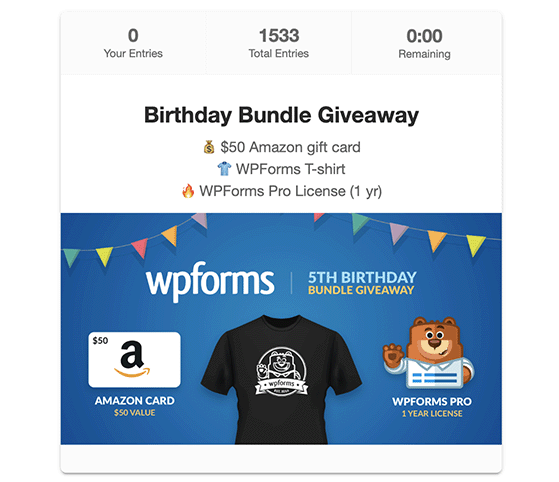
Share your contest in communities relevant to your contest. For example, Facebook groups, forums, or subreddits. These are areas where people already discuss your industry and could be interested in your contest.

However, make sure your post complies with their self-promotion rules.
If you have the budget, invest in paid advertising to boost your contest’s visibility. This could range from Google Ads to social media promotions, each helping your contest reach audiences who wouldn’t otherwise find you.
The more people see your contest, the more likely they will engage. This means more visits to your website and, crucially, more backlinks if they share your contest rules or landing page.
Now let’s look at some more tips to get the most out of your contest’s SEO potential:
Collaborate with influencers or other websites in your industry to host a joint contest or offer cross-promotion.

This can expand your reach and increase link-building opportunities.
Use tools like Google Analytics and Google Search Console to monitor traffic, backlinks, and keyword ranking improvements. This will help you understand what’s working and areas to improve.
Our favorite way to do this is using MonsterInsights, one of the best Google Analytics plugins for WordPress. It displays your analytics metrics right inside WordPress in easy-to-understand reports.
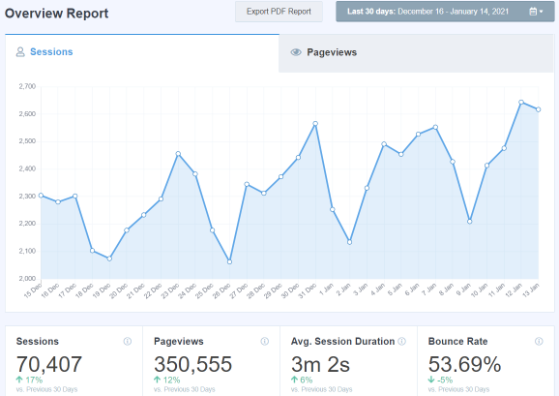
You can also use RafflePress’s Entries Report to see which contest entries drove the most engagement. This information can help you create a more successful contest the next time.

If your contest involves user-generated content, reuse the best submissions in blog posts, social media, or product pages. This creates fresh, engaging content that search engines love.
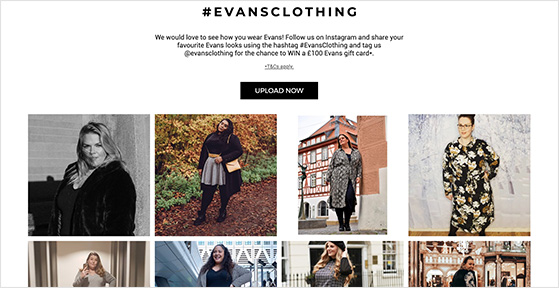
However, first, make sure you get permission from the owner.
If you need some ideas, here are some UGC examples we think you’ll love.
When you choose your contest prizes, consider offering evergreen items. Some good examples are:
This ensures your contest page remains valuable and relevant long after the contest ends. Even better, it can potentially attract organic traffic and backlinks.
Contest SEO works best when it’s part of a complete SEO strategy. Here are the areas to focus on alongside your contests:
If you’re still unsure about SEO, please see this ultimate SEO guide for beginners.
Start by brainstorming what your target audience might search for related to your prize or contest theme. Then, use keyword research tools (like Google’s Keyword Planner or a free option like WPBeginner’s Keyword Tool) to discover relevant keywords with good search volume and align with your contest’s focus.
While you can run a contest manually, contest plugins or platforms make it easier. These tools often include SEO-friendly features, social sharing options, and lead collection tools, making them worthwhile for improving your contest’s visibility.
Contests that encourage social sharing, backlinks, and user-generated content have the strongest SEO impact. These digital marketing campaigns generate valuable signals to search engines that your website is engaging, relevant, and trustworthy.
Contests aren’t just a fun way to engage your audience but a powerful way to fuel your long-term SEO strategy. By following the contest SEO tips in this guide, you’ll attract new visitors, boost visibility, and earn the type of backlinks the Google algorithm loves.
You might also find the following best giveaway marketing tips and guides helpful:
If you liked this article, please subscribe to our YouTube Channel for RafflePress video tutorials. You can also find us on Twitter and Facebook.
Disclosure: Our content is reader-supported. This means if you click on some of our links, then we may earn a commission. We only recommend products that we believe will add value to our readers.
Copyright © 2024 SeedProd LLC. RafflePress® is a registered trademark of SeedProd LLC